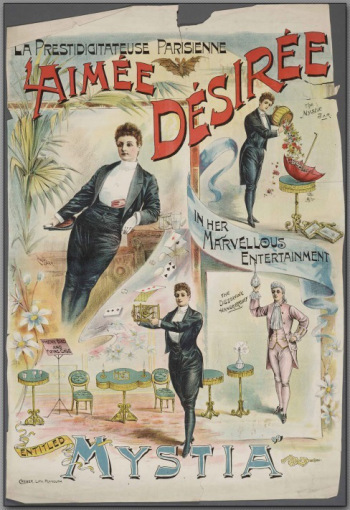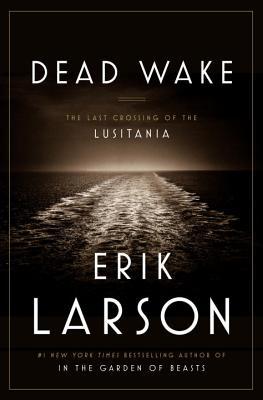Katherine Nabity's Blog, page 193
March 9, 2015
Magicienne Monday ~ Mystia
I like Mondays. On Monday, I am refreshed from the weekend and exhilarated by the possibilities of the week ahead. I also like magic. I like its history, its intersection with technology, and its crafty use of human nature.�� I figured I’d combine the two and make a Monday feature that is truly me: a little bit of magic and a look at the week ahead.
And on every second Monday, I’m going to feature a female magician from past or present.

This poster pretty much sparked Magicienne Monday. Before coming across this lovely sheet for Aimee Desiree at the Victorian Popular Culture portal, I’m not sure I’d seen a poster especially for a female magician. (You can also view it at the Harry Ransom Center.)
From Sidney W. Clarke’s The Annals of Conjuring (The Miracle Factory, 2001):
“Mile. Aimee Desiree (“Mystia”) made her first appearance as a conjurer at the Star Music Hall, Liverpool, on November 25, 1889 and came to the London Pavilion in January 1890. For many years, she performed successfully in this country and in 1909 toured Australia, in company with her husband, George Walter Hunter, himself a clever conjurer though more widely known as a comedian and raconteur. Soon after their return to England, Mystia retired from the stage.
She was one of the most successful of English lady stage conjurers, giving a varied silent show in which sleight-of-hand experiments were judiciously blended with attractive mechanical tricks. Her repertory included an improved version of the Handkerchief and Soup Plates; the Phoenix Canary and the Flying Cage; a Jar of Mystery, from which came flowers and wine; the Peregrinations of a Card; an original transformation of various articles; and other experiments of a similar character.”
Pg 348
What Am I Reading?
Jumped right into Rebecca by Daphne du Maurier after finishing Dead Wake last week. I gotta say, it’s starting a little slow and I was surprised to find that it’s really a YA novel. I should finish Lamont & Wiseman’s Magic in Theory this week and hopefully get a few short stories read.
What Am I Writing?
Missed a Writerly Writer update again yesterday. Maybe I should do one every two weeks?
A mediocre week. Some rewriting. 1583 words. Eric and I have been talking more which is both helpful and disruptive, which is helpful.
On the Blog
Will probably review Fangirl on Thursday. I have an Elmore Leonard story on tap for Deal Me In.

March 7, 2015
Deal Me In, Week 10 ~ “Otherwise Pandemonium”
Hosted by Jay @ Bibliophilopolis
“Otherwise Pandemonium”��by Nick Hornby
Card picked: Nine of Clubs
From: Thrilling Tales, edited by Michael Chabon
Thoughts:
“So let’s say this is the story of how I ended up getting laid–a story with a beginning, and a weird middle, and a happy ending. Otherwise I’d have to tell you a Stephen King-type story, with a beginning and a weird middle and a really fucking scary ending…”*
Except, that really isn’t the story our unnamed narrator tell us. The weird middle gets most of the word count here. (Our narrator is unnamed because he’s decided that us readers don’t need to know “all that Holden Caulfield kind of crap.”) Our narrator, forced by his mother to buy his own VCR, purchases a used model from an appliance repair store. The store’s hippie proprietor is somewhat mysterious about the machine and it’s paranormal abilities are soon discovered.
The story is written in a light engaging style. Our narrator is a fifteen year old boy and his opinions are full of the injustices of life during puberty. He also explains several times that he’s not a creep, but he is fifteen and, you know, wants to have sex.
The title refers to the Johnny Mercer tune “Ac-Cent-Tchu-Ate the Positive,” a song that our narrator’s mother often sings when things aren’t going so well. Like when she signs him up for jazz band in their new hometown of Berkley.
* I had really hoped that I’d draw the ten of clubs next week and read the story after this one in Thrilling Tales: “The Tale of Gray Dick” by Stephen King.
I’m going to put a **SPOILER WARNING** here because what didn’t work for me has to do with the speculative fiction crux of the story.
The VCR allows the watcher to fast forward through network TV, essentially allowing the him to see into the future. For example, he watches the Lakers beat the Pacers in the NBA finals while earlier playoff games are still occurring. This would seem to set this story in 2000. Our narrator continues to watch six weeks into the future when network television suddenly goes dead after a period of disasters/war. But there is also a passing mention to 9/11, which isn’t until 2001. But the story is told from a present that is during the six weeks after the NBA finals. This confuses me and puts me ill-at-ease with this story. After further thought, I suppose it’s possible that Lakers/Pacers matchup might be wishful thinking for 2002. The Pacers were knocked out of playoffs in the first round by the eventual finalists, the Nets. I guess my problem is, if Hornby means to put this in an indefinite future, why use such concrete details? Yes, it gives it reality, but can also cause problems.
About the Author: Nick Hornby is an author I keep *intending* to read, but I haven’t quite gotten to. I’ve had Fever Pitch on my shelf, literally a physical shelf, for a few years now and The Polysyllabic Spree has been on my TRB list for much longer.

March 5, 2015
Review ~ Dead Wake
This book was provided to me by Crown Publishing Group via Edelweiss in exchange for an honest review.
Dead Wake: The Last Crossing of the Lusitania by Erik Larson
On May 1, 1915, a luxury ocean liner as richly appointed as an English country house sailed out of New York, bound for Liverpool, carrying a record number of children and infants. The passengers were anxious. Germany had declared the seas around Britain to be a war zone, and for months, its U-boats had brought terror to the North Atlantic. But the Lusitania was one of the era’s great transatlantic “Greyhounds” and her captain, William Thomas Turner, placed tremendous faith in the gentlemanly strictures of warfare that for a century had kept civilian ships safe from attack. He knew, moreover, that his ship–the fastest then in service–could outrun any threat.
Germany, however, was determined to change the rules of the game, and Walther Schwieger, the captain of Unterseeboot-20, was happy to oblige. Meanwhile, an ultra-secret British intelligence unit tracked Schwieger’s U-boat, but told no one. As U-20 and the Lusitania made their way toward Liverpool, an array of forces both grand and achingly small–hubris, a chance fog, a closely guarded secret, and more–all converged to produce one of the great disasters of history. (via Goodreads)
For me, the joy of nonfiction is when I find myself interested in something I never thought I’d want to know about. I recently realized that my knowledge of World War I is rather scant, but did I really want to know the details of early WWI German submarine warfare? Turns out, I did. At least when Erik Larson is writing about submarine warfare through the lens of Walther Schwieger, the captain of U-20, who sank the Lusitania.
Larson writes nonfiction like pointilists�� paint. Readers are given these individual stories, about Schwieger, about William Thomas Turner the captain of the Lusitania, about President Wilson, about the men, women, and children, survivors and victims. All the details, all the individual little stories that he presents eventually come together to show the larger story, or at least the feel of the larger story.
Dead Wake has a more solid narrative than Thunderstruck or The Devil in the White City. It feels like there was less detective work in the research for this book and more natural narratives in the wealth of accounts and documents the surround the Lusitania and this period of WWI. Despite its subject matter, Dead Wake is a lighter book, but still as entertaining and informative as any of Erik Larson’s other books.
Publishing info, my copy: Kindle/ePub ARC provided by Crown Publishing. Sale Date: March 10, 2015
Acquired: Edelweiss
Genre: Non-fiction

March 4, 2015
Deal Me In Lunar Extra ~ “A Journey”
Hosted by Jay @ Bibliophilopolis
I was very indecisive when picking my Deal Me in Stories, so I added an extra ���Lunar��� twist.
For each full moon, I���ll be reading a horror story written by a woman. (I’m a day early this month. ;) )
“A Journey” by Edith Wharton
Card picked: A Three
From: The Greater Inclination, available for free at Amazon & Project Gutenberg
Thoughts: The physical titular journey is a train trip from Colorado to New York. Our travelers are a young wife and her very sick husband. They had moved to Colorado for his health, but the change in climate hasn’t helped.
On one hand, the woman is relieved to be leaving place she didn’t care for and returning to her old life and friends. On the other hand, this means that her husband won’t be getting better and will soon die. The illness has been terrible, robbing them both of strength and youth. When her husband dies a day away from their destination, she doesn’t tell anyone for fear that she and her husband’s corpse will be put off the train.
Wharton writes the character of the wife in a very neutral way. She could be very unsympathetic as she contemplates the sacrifices she’s made in vain, but instead I can understand her concerns. She’s been defined by her place in society, first as a woman and then as a wife. Now, there is an uncertainty in her life she could have never predicted. I’m reminded of the character of Eleanor Vance in Shirley Jackson’s The Haunting of Hill House. Eleanor is relieved when her ill and demanding mother dies, but also feels deeply guilty about being relieved.
“The Journey”also felt rather Hitchcockian to me. The woman is keenly aware of being watched�� and judged during the entire trip. It only gets worse when she’s keeping an actual secret from them all.
About the Author: I’ll admit it, I’ve tried several times to read The Age of Innocence and have never made it to the halfway point despite adoring the movie and enjoying Ethan Frome. I haven’t read many of Wharton’s short works/ghost stories.
I chose this story via Paula Cappa post about it last year.

March 2, 2015
What Else in February
What Else Did I Read?
Wow, the only non-Deal Me In/Gothic Reading Challenge short story that I read in February was Ray Bradbury’s “The Burning Man.” With its dust and sun, it was a nice contrast to winter weather, even Arizona winter weather. Jay @ Bibliophilopolis read it for his Lunar Extra and, since I have that anthology, I figured I’d give it a read too.
It was a pretty light reading month all in all. Due to more writing? I suppose, maybe.
Writing Work
With weekly updates, no need to rehash what I’m writing on a monthly basis!
Other Life Stuff
From the perspective of January 26th, it seemed like the first of February was going to be a very busy day. New Year Fest was scheduled for that weekend and Eric & I were invited to a Superbowl party for the afternoon. For me, that would have been a lot of people in one day. Sadly/happily, New Year Fest was rained out and, instead, I enjoyed a nice low-key party amid people I like and haven’t seen much of lately.
In other disc news, Spring League is well under way. I like my team. We play well when we play well. The season is somewhat abbreviated which is a shame.
The other thing taking my time is a Python class via Coursera. The title of the course is Programming for Everybody. It’s pretty low level. The first four weeks have been easy; we’ll see how the rest goes.

March 1, 2015
Writerly Writing ~ Update #3
What a crappy, backsliding week.
This past week, I didn’t Write First or Write Again. Therefore, 3000 words did not get written.
I managed 1354. Which wasn’t the worst week in February even though it had two days of no words written.
I could blame lack of sleep. I’ve been in one of those bad sleep stretches which hasn’t been helped by my noisy neighbors. I could blame having other work to do. I’ve been reading through Eric’s first completed draft of PHYSICa. I could blame a bad mood, but my bad mood was probably a result of not getting much done. (For example, I sat down this morning to write, banged out 500+ words, and I feel much better about the world.) I need to work on getting out of my funk more quickly.
This morning was pretty good. A nice reset before Monday.

February 28, 2015
Pinned: March Reading List
Dead Wake by�� Erik Larson – ARC
Magic in Theory by Peter Lamont & Richard Wiseman
Rebecca by Daphne DuMaurier – Gothic Reading Challenge
The Map of Time by Felix Palma
Python for Informatics by Charles Severance – Programming for Everybody!
“Otherwise Pandemonium” by Nick Hornby – DMI Week 10
“A Journey” by Edith Wharton – March Lunar Extra

Deal Me In, Week 9 ~ “The Tears of Squonk”
Hosted by Jay @ Bibliophilopolis
“The Tears of Squonk, and What Happened Thereafter” by Glen David Gold
Card picked: Three of Clubs
From: McSweeney’s Mammoth Treasury of Thrilling Tales, edited by Michael Chabon
Thoughts:
“The Tears of Squonk” is the sad tale of the Nash Family Circus. Under the utterly honest leadership of Ridley Nash (he inwardly winces when referred to as “Colonel” Nash since he never served in the military), the ragtag circus had traveled the US for 23 years before ending up in Olson, Tennessee in March of 1916. Olson is a quiet railroad town. Gold assures us “it was not at all a place for murder.”
Squonk is Joseph Bales, a European-educated clown and the trainer of Mary the Elephant. Mary and Squonk are the circus’s main draw, though Bales has always warned that Mary hates horses. Horses will send her into a frenzy. And this is exactly what happens when Mary spots Timothy Phelps atop his horse as the circus parades through Olson. Mary attacks and kills Phelps rather gruesomely. The town wants justice and Bales has a suggestion: hang Mary using the railroad yard’s derrick.
Nash knows his circus is pretty much sunk without Mary. In fact, he still owes $6500 on his purchase of Squonk and Mary’s contract. He also knows that this is the only thing he can possibly do to make things right with the town. They hang Mary the Elephant and Bales disappears.
The Nash Circus continues to limp along, but Ridley Nash is a changed man. He’s subtly less honest–he doesn’t even protest when the seal trainer, his newest act, insists that his charges are college educated. Nash heads to California alone to scout out new acts and is approached by an ex-railway detective. Mary and Bales may not have been who they seemed to be. Was Mary an insane elephant? Or was she just the tool of an evil man?
This story is based on a bizarre true event. Mary was an elephant who attacked and killed an inexperienced trainer during a parade through Kingsport, TN in 1916. The circus owner, Charlie Sparks, decided that public execution was the solution and Mary was hung in the Clinchfield Railroad yard. This might only be considered folklore if not for a photograph of the event. (via Wikipedia)
Previously: Carter Beats the Devil was one of my top reads a couple years back and a story by Glen David Gold was definitely a reason this anthology caught my eye. Gold seems to have a talent for setting historical fiction slightly askew to reality, which I really envy.

February 27, 2015
Review ~ The Writing Dead
This book was provided to me by University Press of Mississippi via NetGalley in exchange for an honest review.
The Writing Dead: Talking Terror with TV���s Top Horror Writers by Thomas Fahy
The Writing Dead features interviews with the writers of today���s most frightening and fascinating shows. They include some of television���s biggest names���Carlton Cuse (Lost and Bates Motel), Bryan Fuller (Hannibal, Dead Like Me, Wonderfalls, Pushing Daisies), David Greenwalt (Angel and Grimm), Gale Anne Hurd (The Walking Dead, The Terminator series, Aliens, and The Abyss), Jane Espenson (Buffy the Vampire Slayer and Battlestar Galactica), Brian McGreevy (Hemlock Grove), Alexander Woo (True Blood), James Wong (The X-Files, Millennium, American Horror Story, and Final Destination), Frank Spotnitz (The X-Files and Millennium), Richard Hatem (Supernatural, The Dead Zone, and The Mothman Prophecies), Scott Buck (Dexter), Anna Fricke (Being Human), and Jim Dunn (Haven).
The Writing Dead features thought-provoking, never-before-published interviews with these top writers and gives the creators an opportunity to delve more deeply into television horror than anything found online. In addition to revealing behind-the-scene glimpses, these writers discuss favorite characters and story lines and talk about what they find most frightening. They offer insights into the writing process reflecting on the scary works that influenced their careers. And they reveal their own personal fascinations with the genre.�� (via Goodreads)
This book of interviews has a great pedigree. If you’ve watched any “horror” television in the last 15 years, you’ve seen these writers at work. Unfortunately, the last 10 years has been hard on some of the periodicals, like Starlog and Fangoria, that often provided fans with this sort of longer form interviews. Thomas Fahy works from a certain set of questions (such as “What do you think are some of the biggest pitfalls in horror writing?” and “What is the best criticism that you’ve received as a writer?”) as well as asking more project- and writer-specific questions.
A few observations:
Many of these writers had very little “genre” experience before working on their horror show. Most rely on really good characters to carry them through. One of the exceptions is Brian Fuller (executive producer/writer of��Hannibal and creator of��Pushing Daisies and��Dead Like Me). Fuller’s interview was�� the primary reason I requested this ARC. Fuller gives a lot of props to the horror literature and movie canon that has gone before him, something I was surprised to find lacking in many of the other interviews.
(Personally, I think Fuller is doing some of the best work in horror TV at the moment. I was also sad that his Mockingbird Lane didn’t get a mention.)
One thing that many of these TV projects have in common is that they are based on previously existing sources (examples Hannibal, True Blood, Dexter, Bates Motel). One of the great things Fahy asks each of these writers is how they deal with, as�� Carlton Cuse puts it, “the long shadow” of the earlier work. Cuse, for example points out that Bates Motel removes itself from��Psycho by setting what is technically a prequel in a modern setting, which is chronologically after the movie and its sequels.
I was amused by how many writers dodged the question of the best criticism they’ve gotten in their careers.
Publishing info, my copy: University Press of Mississippi, ARC, PDF copy. The Kindle version of this document contained wonky formatting. This book will be released on March 3, 2015.
Acquired: NetGalley
Genre: Non-fiction, television & film

February 23, 2015
Magic Monday ~ The Sphinx, February 1905
I like Mondays. On Monday, I am refreshed from the weekend and exhilarated by the possibilities of the week ahead. I also like magic. I like its history, its intersection with technology, and its crafty use of human nature.�� I figured I’d combine the two and make a Monday feature that is truly me: a little bit of magic and a look at the week ahead.
[image error]The English Notes column by Harry Whitley in the February 1905 edition of The Sphinx covered one of the seminal wizard wars of the 20th century: the squabble between Ching Ling Foo and Chung Ling Soo. Ching Ling Foo, a magician actually from China, wanted to expose Chung Ling Soo (William Robinson) to be a fraud. The press was less interested in that story and more interested in a head-to-head talent battle between the “Oriental” magicians. Though Ching Ling Foo had previously suggested such a contest, he failed to appear for the showdown.
Two notes:
I’m not the only one to often scramble these names. The event is retold twice in this issue of The Sphinx, but the first time the feud is between Ching Ling Foo and Chung Ling Loo though all the other details are the same. I don’t find any info on Chung Ling Loo, though Englishman Stanley Collins does take the performing name of Loo Sing in 1905.
Second, Wikipedia notes that Ching Ling Foo’s engagement at the Empire Theater lasts only four weeks and Chung Ling Soo remains at the Hippodrome for three months [1]. The implication that the stunt hurt Ching Ling Foo. Whitley notes:
The great Chinaman, Ching Ling Foo, also opened at the Empire, but his show contains nothing new or original, and his company of artists have a better reception than he has. [2]
http://en.wikipedia.org/wiki/Chung_Ling_Soo
Whitley, Harry. “English Notes.” The Sphinx, Vol. 3 No. 12, February 1905, pg. 154
What Am I Reading?
I did a silly thing last week and picked up Rainbow Rowell’s Fangirl. I probably wouldn’t have if she wouldn’t have started it in Pound Hall. I lived in Pound Hall! I’ve also promised Eric that I’d read PHYSICa this week. Dead Wake is on the back burner.
What Am I Writing?
I didn’t get to my Writerly Writing update yesterday. Last week went well-ish. I wrote 3600 words. Didn’t do any rewrites, and started about half dozen scenes. I suppose I’ll have to finish one or two of those this week. The current plan is still going well. Starting in March, I might add a monthly goal in addition to my daily and weekly goals (300 words & 3000 words).
On the Blog
Review of The Writing Dead
Review-a-thon? Maybe.
So, what are you reading? Any magic to share?











